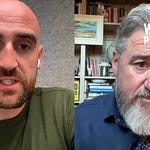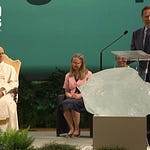So. Fun story. Rupert Read, co-director of the Climate Majority Project and Professor Emeritus of Philosophy at University of East Anglia, got in touch after our weekend episode:
To be fair, we had mentioned his role in amplifying a piece by Jonathan Leake in the Telegraph, which quoted IPCC jefe Jim Skea, and the headline of which piece said he was calling time of death on the Paris Agreement goal of limiting warming to 1.5C.
As Read bluntly puts it, what Skea actually said is, "1.5°C is slipping away"—but that should not be a comfort: it’s a phrase he notes is usually associated with moment when a person is slipping away from life.
Rupert argues that it's time to admit this failure, embrace the psychological impact, and use it to build momentum for the next phase of the climate struggle. This isn't about giving up; it's about moving beyond the impossible and starting to take adaptation, loss, and damage seriously. Together, we dive into the implications of this hard truth, the resistance from within the climate community, and what happens once we stop pretending we can hold the line at 1.5°C.
Some key points from our conversation include:
1.5°C as the Maginot Line: Read compares the climate community’s adherence to the 1.5°C target to France’s ill-fated defense strategy during World War II. Like the Maginot Line, holding on to 1.5°C when it has already been breached does more harm than good by distracting from more realistic and necessary action.
Admitting Failure, Unlocking Power: Read emphasizes the need to acknowledge failure as a turning point. He references his viral 2018 talk, This Civilization is Finished, which resonated because it wasn't about false hope—it was about truth, grief, and the courage to move forward together. Facing the reality of 1.5°C's loss could catalyze a powerful shift in climate action.
Why Not Everyone Wants to Let Go: Throughout our conversation, we explore the reluctance from key figures in the climate establishment to publicly admit that 1.5°C is gone. Fear of triggering widespread despair or "doomerism" keeps many leaders in line with the 1.5°C goal, but Read counters that the real danger lies in continued denial, not in accepting reality.
The Moral Case for Honesty: In addressing what Read calls the "noble lie" stratagem, he argues that the climate establishment’s reluctance to tell the truth may be well-intentioned, but ultimately, it's misguided. Instead, he advocates for a new narrative—one rooted in courage, collective responsibility, and shared resilience.
Minutes to Midnight: As we edge closer to climate disaster, Read likens our current moment to the final minutes before midnight, where decisions made now will determine the fate of future generations. He believes that accepting we’ve passed the point of no return on 1.5°C is the wake-up call humanity needs to mobilize on adaptation and loss and damage at scale.
As always, we aim to spark difficult conversations, and this episode is no exception. It’s an honest, sometimes uncomfortable, but necessary discussion about where we are in the climate fight—and where we need to go next. Rupert’s insights are invaluable for anyone grappling with the reality of our climate crisis and looking for a path forward that doesn’t rely on false hope, but on actionable truth.
Listen now to hear more from Rupert Read on Wicked Problems: Climate Tech Conversations.
Do you like the outro tracks? We try to have a bit of fun with them.
Key Takeaways
Data says 1.5°C is increasingly unattainable and yet we can’t let go. Which may be distracting from necessary efforts in adaptation and damage control.
Acknowledging failure could lead to a stronger and more determined climate movement.
The climate community’s reluctance to abandon 1.5°C stems from fear of public despair, but embracing the truth might actually empower greater action.
Real resilience comes from facing hard truths, not clinging to false hopes.
Thanks for reading and tuning in. Let’s keep these critical conversations going.














